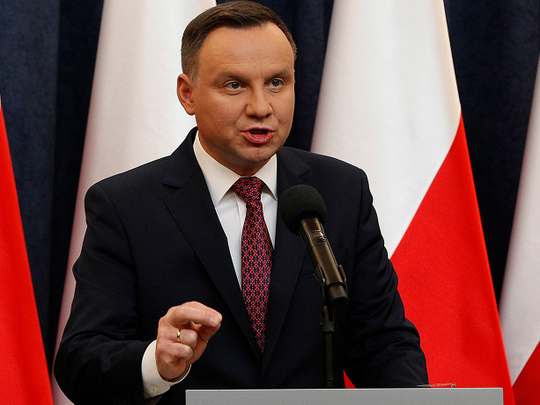
Warsaw: Poland’s president on Wednesday said he signed into law two controversial judicial reforms that opposition politicians and the EU insist undermine the rule of law and the separation of powers.
President Andrzej Duda said he had “decided to sign” reforms to the Supreme Court and the National Council of the Judiciary (KRS) pushed through parliament this month by the rightwing Law and Justice (PiS) government.
His move came as the European Union launched unprecedented disciplinary proceedings against Poland on Wednesday over a long string of highly controversial judicial reforms which Brussels says threaten the rule of law.
The two new reforms endorsed by Duda allow parliament — now dominated by the governing PiS party — to decide who sits on the KRS body meant to guarantee judicial independence and empower the president to decide which judges may stay on in the Supreme Court after the age of 65.
Council of Europe Commissioner for Human Rights, Nils Muiznieks, has insisted that the new reforms “will further undermine the independence of the judiciary by subordinating it to the executive and the legislature and will thereby further erode the separation of powers and the rule of law.”
Duda, however, defended the constitutionality of his moves Wednesday insisting that in the “United States the president chooses Supreme Court judges, while the Senate gives its opinion; judges’ circles have no say in the matter.”
The new Polish law on the Supreme Court reduces the retirement age of its members to 65 from 70 as a way to “decommunise” it by removing judges who served in communist courts before the regime collapsed in 1989.
The president can however allow individual judges to continue working until 70 years of age.
Critics insist the measure is illegal as it requires the departure of the court’s existing chief justice, Malgorzata Gersdorf, who is only half way through the her constitutionally mandated six-year term.
Critics also allege that the PiS administration simply wants to purge a judiciary it believes is still stacked in favour of supporters of former liberal prime minister Donald Tusk, a political arch-rival who is now president of the European Council.
Reforms to the KRS, mean that parliament will now choose its 15 judges. Previously, judges themselves chose its members.
Duda himself proposed new versions of the reforms of the Supreme Court and the KRS after he vetoed changes backed by the PiS government in July.
He had argued that the legislation gave too large of a role to the attorney general, who in Poland is also the justice minister.
The initial reforms had sparked massive street protests, concern from the US State Department and threats of EU sanctions.












